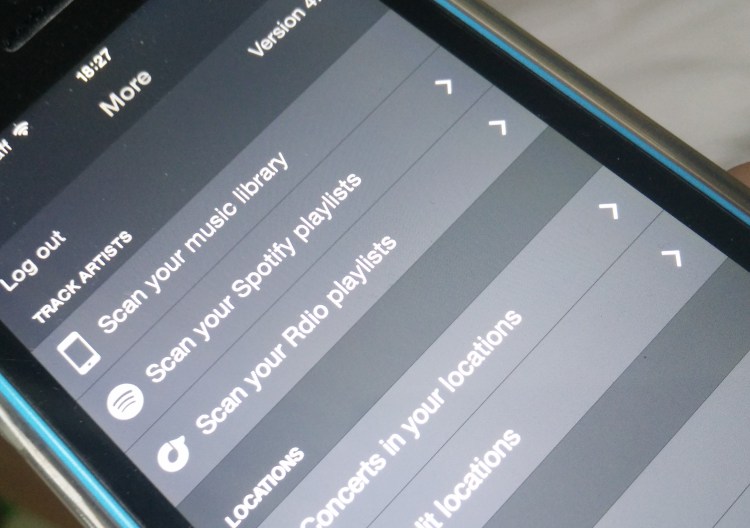Songkick, the company behind the eponymous cross-platform app that lets you track when and where all your favorite bands are playing live, has raised an additional $10 million in funding from Access Industries.
Founded in 2007, Songkick had previously raised $32.6 million from a range of notable investors, including Y Combinator, Sequoia Capital, Index Ventures, and Access Industries.
The London-based startup has built a solid reputation in the live music sphere over the past eight years for the way it helps users discover live gigs based on the music they listen to. It scans a user’s music collection — locally stored or cloud-based — and matches it with Songkick’s inventory of live shows. Users then receive alerts whenever an artist in their collection is scheduled to play nearby.
A natural extension to this is, of course, ticketing. While Songkick made a business of referring fans to ticket-selling websites for a while, back in 2013 it started trialing a service that involved selling tickets to fans directly. But this still wasn’t a core part of its offering until Songkick merged with artist-ticketing service CrowdSurge, back in June.
The ultimate goal is to create a frictionless discovery and ticketing process — one app, one transaction. And this is why the merger made a great deal of sense for both companies. CrowdSurge cuts out the middlemen and works directly with the artists to ensure their fans know about live dates and procure tickets.
Almost half a year after this merger, Songkick says that it has tripled its ticket sales in Europe, and claims to be ticketing one-third of all concerts in London. It’s also working with a number of big-name acts, including Paul McCartney, Adele, Metallica, and Mumford & Sons.
The Adele tie-up is particularly notable, not least because she is one of the biggest-selling stars on Earth just now. But the partnership focuses specifically on curbing the much-maligned “secondary market” for tickets, in which scalpers scoop up as many tickets as they can and sell them at a vastly inflated price. In conjunction with Songkick, Adele shifted more than 165,000 tickets (40 percent) for her European tour directly to fans through her own website.
In an interview with VentureBeat, co-chief executives Ian Hogarth and Matt Jones explained how they’re using proprietary software to determine which ticket sales are likely to scalpers, and to then cancel those transactions. While they are hesitant to reveal exactly how it works (to avoid giving scalpers an advantage) and how the program can distinguish a genuine fan buying multiple tickets from someone looking to sell those tickets for a profit, they did say that they have successfully thwarted 18,000 “known” or “likely” scalpers. They say they helped U.K. Adele fans save more than $6 million in the process.
However, the process hasn’t been without its share of problems — some fans claimed that their personal data was breached during the booking process. Songkick admitted that a technical problem was caused by the sheer amount of traffic to the site, but added: “At no time was anyone able to access another person’s password, nor their payment or credit card details [which are not retained by Songkick].”
@BBCNewsEnts @Adele got through to buying tickets but it came up with someone else's screen with their card details & home address for SSE.
— Kiran Farmah (@KiranFarmah) December 1, 2015
But the Adele story is key to how Songkick plans to spend its latest cash influx. “It’s going to be about taking that technology and bringing it to market with other artists next year,” said Hogarth. In other words, they have scalpers firmly in their crosshairs. And it should prove easy to garner the attention of even more artists who have become weary of the secondary ticketing marketplaces and their exorbitant prices.
For now, Songkick is continuing its Adele tie-up for her North American tour, which kicks off this week. But the overall aim is still to help monetize the 40-50 percent of all concert tickets that Songkick says go unsold each year.
Songkick isn’t alone in the event-discovery and ticketing space. Fellow London startup YPlan, which has raised $40 million to date, offers a similar proposition, except it isn’t focused specifically on music. Plus, YPlan is more geared toward last-minute ticketing. But, if nothing else, it shows there’s a potentially big market helping people find fun things to do, with as little friction as possible.


